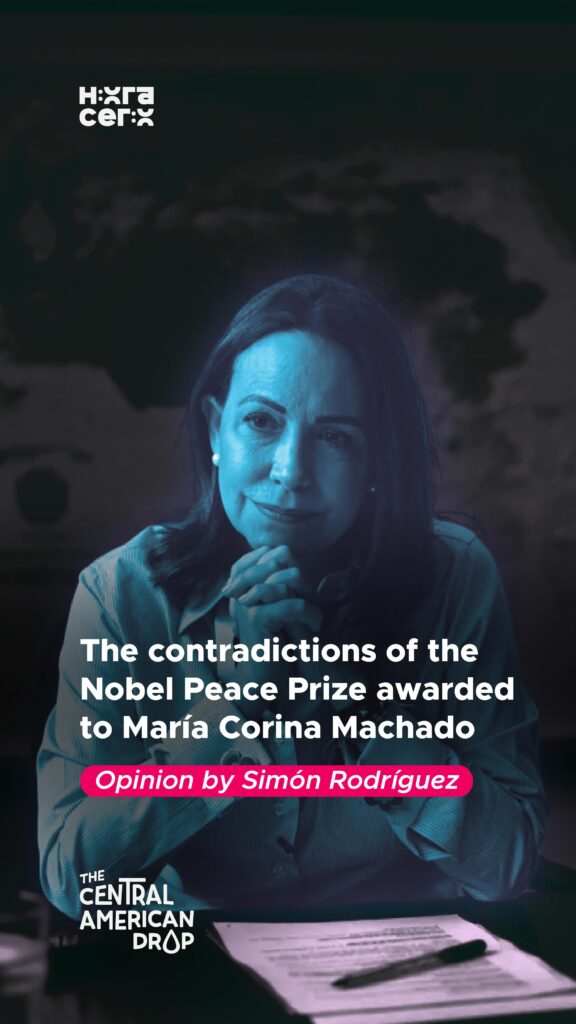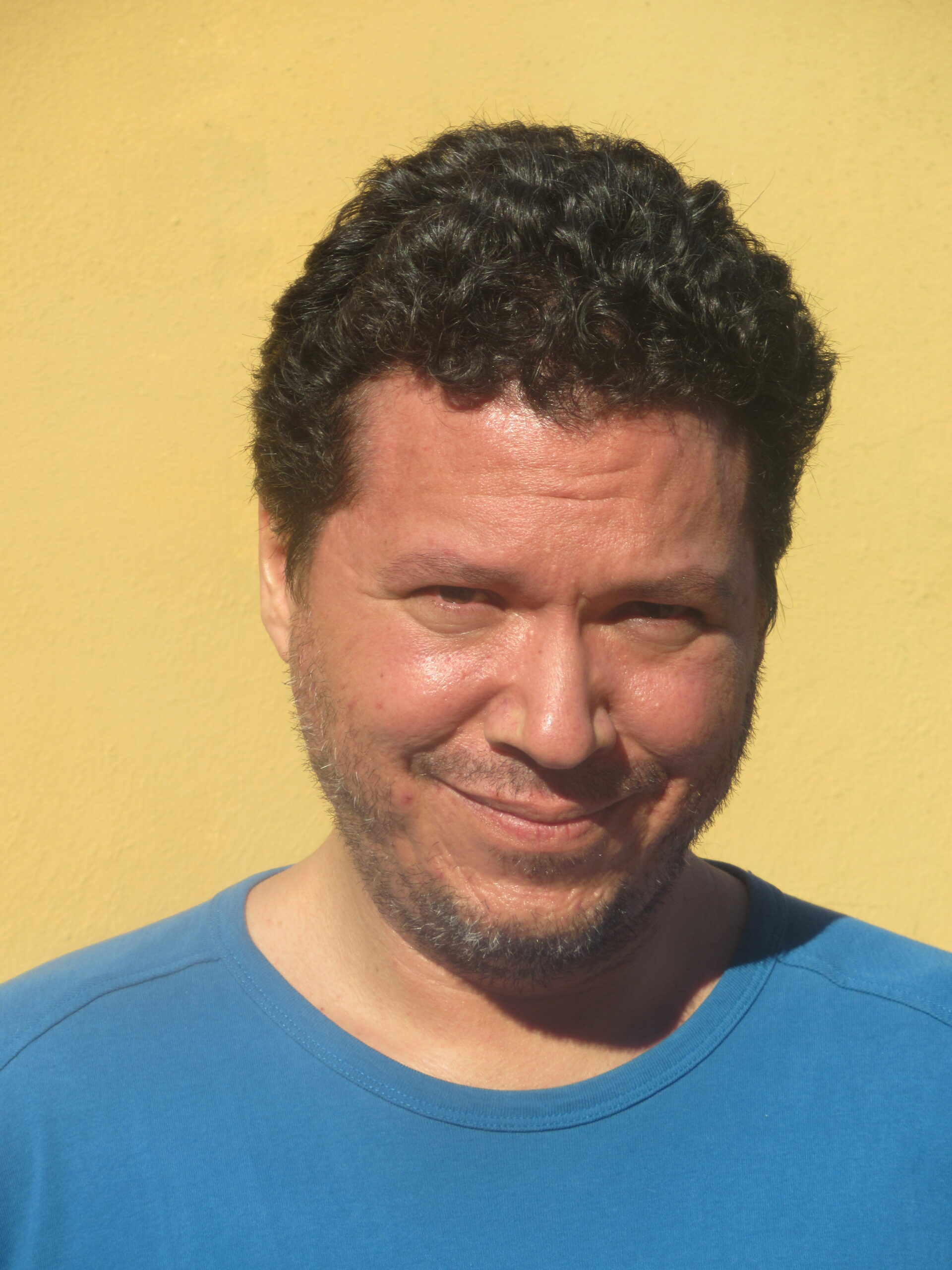
On October 10, it was announced that María Corina Machado had been awarded the Nobel Peace Prize. The committee stated that it was rewarding her “tireless work promoting democratic rights” and her “struggle for a just and peaceful transition from dictatorship to democracy.” It also credited her with opposing militarism. As we shall see, Machado opposes Venezuelan militarism but supports others, such as Israeli militarism, and firmly believes that the “transition,” that is, the fall of the dictatorship, depends on U.S. military intervention, a perspective that isn’t very peaceful or democratic.
Machado dedicated her prize to U.S. President Donald Trump. A week after receiving the award, she telephoned Israeli Prime Minister Benjamin Netanyahu, a genocidaire with an arrest warrant from the International Criminal Court, and congratulated him on “his decisions and firm actions during the war, as well as Israel’s achievements.” Since 2020, Machado’s party, Vente Venezuela, has been linked to Netanyahu’s Likud through a formal alliance.
Machado also supports the far-right European parliamentary group Patriots, which includes the Spanish party Vox, France’s Marine Le Pen, and other European Trumpists. In her message to the Patriots summit in February this year, Machado stated that Patriots’ struggle and her own are part of the same “global struggle”: “the (struggles) taking place in Europe, like those we are waging in Venezuela, have the same values, purposes, and enemies.” She claimed that both Patriots and herself represent “strong movements and leaderships based on values.”
Machado, an important political leader in a country with around 8 million forced migrants, a quarter of the Venezuelan population, not only supports xenophobic and racist parties, but also directly exploits American and European xenophobia to her advantage. “Venezuela is today the greatest threat facing the West […] Maduro has intentionally promoted migration as a mechanism to weaken our society and our families and to destabilize the hemisphere,” Machado said in her message to Patriots.
She has also supported Trump’s persecution of Venezuelan migration. In March of this year, Machado signed a statement repeating the thesis of an alleged export of “criminals employed by the Maduro regime to commit crimes abroad,” just as Trump was sending innocent Venezuelans to be tortured in Guantánamo and El Salvador. Contradictorily, she called for Venezuelan migrants not to be indiscriminately criminalized, but the conspiracy theory that Maduro is destabilizing “the hemisphere” by exporting criminals contributes to a climate of persecution and general suspicion.
Another example of this willingness to support the violation of Venezuelans’ human rights, if the violator is not Maduro’s dictatorial regime, is evident in the support for Trump’s war crimes in the Caribbean. In the weeks before and after the Nobel Peace Prize was awarded, the Trump regime bombed at least nine boats in the Caribbean and the Pacific Ocean, killing 37 people, mostly Venezuelans, but also Colombians, Trinidadians, and possibly people with other nationalities. No evidence that they were drug traffickers has been made publicly available, and the boats were bombed without posing an imminent military threat to the US. At least one Ecuadorian survivor of a US bombing was repatriated without being charged with any crime, which increases skepticism about the official US narrative.

Machado has also embraced the Latin American far-right. When former Colombian President Álvaro Uribe was convicted in July this year of witness tampering to cover up his ties to narco-paramilitarism, Machado sent him a public message of “solidarity, trust, and affection.” Under Uribe’s government, thousands of young Colombians were executed and falsely presented as guerrillas through the so-called “false positives” method.
Trump’s designation of the Venezuelan government as a narco-terrorist entity, and therefore a threat to the US, bears similarities to the arguments used as a pretext for invading Iraq in 2003. Venezuela is primarily a transit country for the drugs that the US and Europe consume abundantly, but its role is much smaller than that of US-allied regimes such as Ecuador. The name Cartel de los Soles (Cartel of the Suns) emerged before Chavismo came to power as a way of referring to military corruption related to drug trafficking. Even US intelligence circles know that it is not a drug-producing and exporting cartel. As for organized crime, there is evidence that the Venezuelan government has entered into agreements and negotiations with organizations such as the Tren de Aragua gang, handing over control of prisons or “peace zones” free of police presence, and even establishing agreements related to illegal gold mining in the south of the country, but US intelligence itself denies that it is an arm of the Venezuelan government, as Trump and Machado claim, or that it operates as a gang in the US. But this is not an exclusively Venezuelan phenomenon, deals with gangs have also been made by US-allied governments, such as Bukele’s.
Machado is committed to a political strategy that relies on US military pressure. So much so that when the Venezuelan regime perpetrated a scandalous electoral fraud in July 2024, both Machado and Edmundo González refused to support the large spontaneous mobilizations of the Venezuelan people in defense of the electoral result, abandoning them to their fate, without guidance and exposed to the regime’s savage repression. This political irresponsibility overshadows the great organizational success of having achieved not only a sweeping electoral victory but also documenting that victory with the electoral tallies. It became clear that in Machado’s electoral slogan, “win and collect,” there was no plan to “collect” beyond waiting for foreign intervention.
Generally, Machado’s followers, like those of any charismatic leader, project their own ideas onto her. Hence, when her orientations, speeches, and alliances prove uncomfortable due to their anti-democratic content, such as supporting the genocide in Gaza, many prefer to believe that these are tactical feints or decisions forced by circumstances that do not reflect Machado’s own ideas. We are familiar with such rationalizations in Venezuela because for many years they were common among Chávez’s followers.
But Machado’s trajectory has been quite consistent, from taking part in the 2002 coup d’état as a signatory of Carmona’s self-proclamation decree, to her commitment to Thatcherite “popular capitalism” in 2012, to her call to annex the Guyanese Essequibo region in 2013, from her criticism of Guaidó in 2019 for not calling for a US invasion, to her current commitment to Trumpist military pressure. All these positions are reflected in her international alliances and in a strategy in which imperialist intervention has a messianic role. The contours of this program were defined long before Machado won more than 92% of the votes in the 2023 opposition primaries to choose a presidential candidate.
Certainly, the complicity of corrupt sectors of the international Left, which have continued to support Chavismo even after its dictatorial turn in 2015, contributes to alienating the Venezuelan people, who are fed up with the self-proclaimed “civil-military-police” government and accustomed to associating the catastrophic experience of Chavismo with a certain type of pseudo-leftist demagogy. But it is also true that Machado’s alignment with leaders such as Netanyahu and Trump isolates the Venezuelan popular struggle by creating a false identification between a genuinely democratic cause and its current right-wing and anti-democratic leadership.
The Left in Latin America and around the world has powerful reasons to support the cause of the Venezuelan people, who are facing extreme impoverishment as a result of the destruction of three-quarters of the economy over the last twelve years and an extreme labor flexibilitzation imposed by Chavismo. This is a historic setback for the working class, consummated before Trump’s first economic sanctions in 2017. Virtually no left-wing organization in Latin America, Europe, or the US would accept a minimum wage of less than one dollar a month in their country, or the persecution of trade unions and the environmental destruction we endure in Venezuela.
It must be acknowledged that the weakness of international leftist support for the Venezuelan cause is also partly due to the weakness of the Venezuelan left itself. For many years, most of the local left was co-opted by the two capitalist poles in the political dispute, the traditional bourgeoisie of which Machado is a member and the new Bolivarian bourgeoisie represented by Maduro. Only in the last five years have most left-wing organizations adopted an independent opposition perspective, although fragmentation continues to prevail for historical reasons.
As long as the Venezuelan popular struggle is mistakenly associated with support for Trump and Israel, it will be very difficult to garner sympathy beyond right-wing circles. The Venezuelan left-opposition, in its different currents, traditions, and strategies, represented by organizations such as the Communist Party of Venezuela, the Socialism and Freedom Party (PSL), Patria Para Todos (PPT-APR), or even grassroots Chavista organizations opposed to Maduro, represents a fundamental interlocutor for the Latin American left, as a sector that refutes in practice the dilemma of choosing between supporting Maduro and Putin, or Machado and Trump.
It is possible to oppose both imperialist intervention and the Bolivarian dictatorship. Opposition to the US invasions of Iraq and Panama never required support for Hussein or Noriega, nor minimizing their dictatorial crimes. It is time to do the same now.
The disaster that the Chavista counterrevolution has represented, with its legacy of misery and inequality, is exploited by the international right-wing to discredit the struggles for social justice, environmental protection, women’s rights, and democratic freedoms. The Venezuelan right-wing opposition has fueled conspiracy theories that blame the Venezuelan government for the social unrest in the region, and it routinely intervenes in electoral processes with melodramatic warnings that not voting for the Right will mean “becoming Venezuela.” It should be increasingly clear that only by firmly opposing dictatorships such as those of Maduro and Ortega, without supporting Trump and his imperialist and fascistic delusions, condemning both the US bombings in the Caribbean and the threats of bombings on the mainland, is it possible to build more solid and credible alternatives to the advance of the extreme right in the region.

| Cookie | Duración | Descripción |
|---|---|---|
| cookielawinfo-checkbox-analytics | 11 months | This cookie is set by GDPR Cookie Consent plugin. The cookie is used to store the user consent for the cookies in the category "Analytics". |
| cookielawinfo-checkbox-functional | 11 months | The cookie is set by GDPR cookie consent to record the user consent for the cookies in the category "Functional". |
| cookielawinfo-checkbox-necessary | 11 months | This cookie is set by GDPR Cookie Consent plugin. The cookies is used to store the user consent for the cookies in the category "Necessary". |
| cookielawinfo-checkbox-others | 11 months | This cookie is set by GDPR Cookie Consent plugin. The cookie is used to store the user consent for the cookies in the category "Other. |
| cookielawinfo-checkbox-performance | 11 months | This cookie is set by GDPR Cookie Consent plugin. The cookie is used to store the user consent for the cookies in the category "Performance". |
| viewed_cookie_policy | 11 months | The cookie is set by the GDPR Cookie Consent plugin and is used to store whether or not user has consented to the use of cookies. It does not store any personal data. |